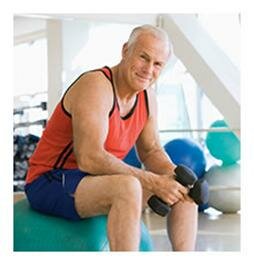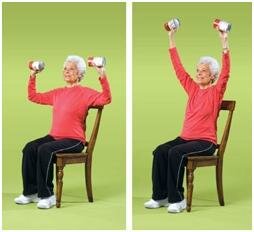Image Reference: Courtesy of Wikipedia
Starting or maintaining an exercise routine can become more of a challenge as you get older. You may feel less energetic, have health conditions or perhaps, have incurred injuries. Whatever the case, it can be hard to motivate yourself or figure out where to begin.
First and foremost, it is most important to remember that exercise benefits people of all ages, so using your age as an excuse simply won’t suffice. Time and time again, experts tell us that a healthy diet with regular exercise is a key for a long healthy life and this rings through for older people too. Studies have shown older people who walk six miles a week could avoid brain shrinkage and preserve memory later in life. Research has also shown that regular exercise can reduce the risk of Alzheimer’s disease by up to 40%. So, there are endless reasons why you should start exercising or continue to exercise after you hit 60. Remember that committing to an exercise routine is perhaps one of the healthiest decisions you can make.
Before you make a start on your own fitness routine and in order to allow a smooth transition, it is worth considering the below advice.
Image Reference: Courtesy of Pixgood
Talk to Your Doctor
If you’re starting exercise for the first time or it has been a while since you were involved in any type of physical activity, it is advisable to talk to your doctor about your intentions beforehand. They will be able to give you the proper medical advice and let you know if there’s any exercises you may need to avoid. This is particularly important if you have a pre-existing health condition.
Image Reference: Courtesy of Wikipedia
Start Slow
It doesn’t help to go full force into exercise if you haven’t been active in a while. Instead, take the time to build up your exercise program little by little. For example, you could try spacing out workouts in ten-minute increments twice a day. Or perhaps, try just one class each week.
Keep Yourself Motivated
Of course, maintaining motivation can be a common challenge for a person of any age. It helps to have some short-term goals, such as improving your mood and energy levels, rather than objectives such as weight loss as these can take longer to achieve. Furthermore, try your best to commit to an exercise plan for at least three or four weeks so that it becomes habit, and force yourself to stick with it.
Be Conscious of Any Health Concerns
It is vital that you are aware of how your ongoing health problems effect your workouts. For example, diabetics may need to adjust the timing of medication and meal plans when setting an exercise schedule. Also, you really need to be aware of how your own body is responding to physical activity – if you feel dizzy, short of breath or develop chest pain, stop immediately. It may be the case that you need to scale back or try another type of activity. Also, if you are unsure as to how to proceed with your physical exercise, be sure to consult your doctor.
Stay Safe
If you are exercising alone then it is advisable that you tell someone of your intentions beforehand, this is especially important if you suffer from any health conditions. In addition, if you exercise outdoors, carrying a panic alarm can be a great way to provide you with peace of mind. A panic alarm needn’t necessarily stand out, there are a whole variety of alarms on the market today that can easily blend in with your sport attire. A sport pedometer with a panic alarm is just one example, not only will this discreetly ensure your safety but also, it will enable you to track the distance you’ve travelled as well as the calories you’ve burnt.
Wherever you’re based, be it your own home a care home or retirement village, it is crucial that you do some kind of physical activity to maintain and improve your physical health. Physical activity not only helps you to strengthen your bones and muscles and reduce your risk of heart disease, it is also essential for your mental health. Exercise releases endorphins, which create feelings of happiness and studies have even shown that exercise can alleviate symptoms among the clinically depressed. Be assured that as an older adult you will benefit immensely from doing regular exercise.











